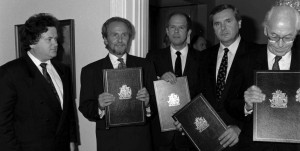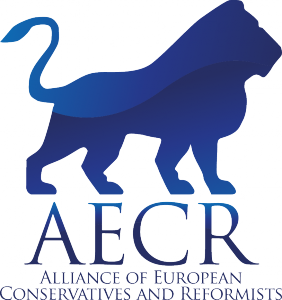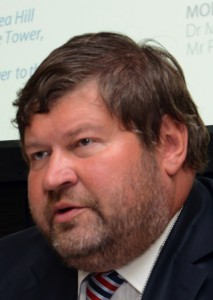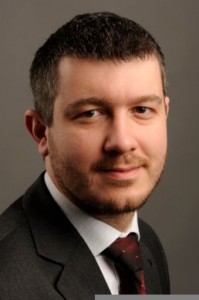
26 August 1991. From left: David Oddsson, Jon B. Hannibalsson, A. Saudargas, Lithuania, J. Jurkans, Latvia, and L. Meri, Estonia.
23 August has been designated, by the European Parliament, as European Day of remembrance for victims of totalitarianism, both communism and nazism. On this day in 1939 Hitler and Stalin made their non-aggression pact, launching the 2nd World War and dividing Central and Eastern Europe up between the two dictators. On 23 August 2013, at 16 o’clock, a photo exhibition on the International Communist Movement and its Activities in Iceland will be opened at the National Library of Iceland. The exhibition is organised by RNH in cooperation with the National Library, with Professor Hannes H. Gissurarson responsible for the photos and the text and Sogumidlun ehf. for the design.
On this occasion, historian Dr. Mart Nutt, Member of the Estonian Parliament and of the Supervisory Board of the Estonian Institute of Human Rights, will deliver a paper on “Estonia: a Small Nation Under Foreign Yoke”. Forty years ago, in 1973, an Icelandic translation by then law student David Oddsson appeared of a book by Anders Küng of the same name (in Icelandic, Eistland: Smathjod undir oki erlends valds). As Prime Minister in 1991, Oddsson, in close co-operation with Foreign Minister Jon B. Hannibalsson, led the move to re-recognise the three Baltic states, under foreign occupation from 1940 to 1991. Iceland was the first state to do so after the collapse of the Soviet Union. Born in 1962, Mart Nutt completed his doctorate at the Technical University in Tallinn in 2011. Trained as a historian, his dissertation was on international relations. He has written books on Estonian history and worked in the Ministry of Foreign Affairs, but is now a member of Parliament for the centre-right unified Pro Patria and Res Publica parties.
On this occasion, also, Dr. Pawel Ukielski, deputy director of the Warsaw Rising Museum, will give a lecture on the Warsaw Rising in 1944 which the Nazis met with indescribable cruelty, methodically and mercilessly killing all the Poles they caught and trying to raze the whole city to the ground, while Stalin’s Red Army watched, doing nothing, on the other side of Vistula, the river running through Warsaw. In the 18th Century, the Russians, the Austrians and the Prussians divided Poland up between themselves, and after Hitler and Stalin had signed their non-aggression pact in 1939, they divided Poland again up between themselves. After the War, communists ruled the country with the help of the Soviet Army. Poland became fully free only after the collapse of the Soviet Union. Born in 1976, Pawel Ukielski completed his doctorate at the Warsaw School of Economics in 2006. He has published numerous books and papers in his field. He works for the Polish Academy of Sciences and teaches politics at the private Collegium Civitas in Warsaw, as well as being deputy director of the Warsaw Rising Museum.
 After the two lectures, there will a questions-and-answers session, followed by a reception at the National Library. Iceland’s Atlantic Alliance, Vardberg, and the Institute of International Affairs at the University of Iceland are the co-sponsors of the event. It is a part of the project “Europe of the Victims” which RNH and AECR, Alliance of European Conservatives and Reformists, have been jointly organising since 2012.
After the two lectures, there will a questions-and-answers session, followed by a reception at the National Library. Iceland’s Atlantic Alliance, Vardberg, and the Institute of International Affairs at the University of Iceland are the co-sponsors of the event. It is a part of the project “Europe of the Victims” which RNH and AECR, Alliance of European Conservatives and Reformists, have been jointly organising since 2012.




